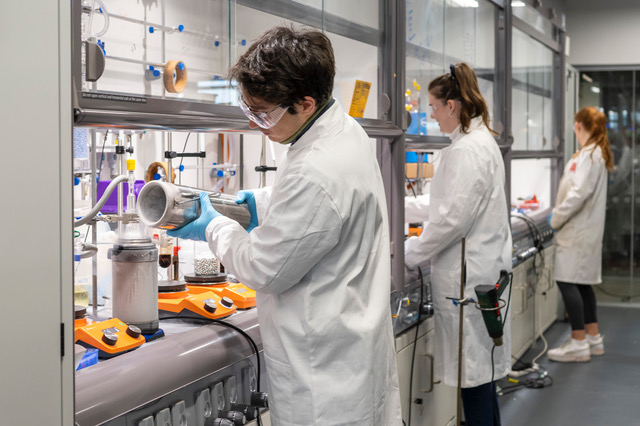Catalysis for Net Zero
14 July 2023
Cardiff University’s Translational Research Hub (TRH) works with industry to develop solutions to society’s grand challenges. At the recent TRH launch event, Professor Duncan Wass, Managing Director, Cardiff Catalysis Institute, outlined why catalysis has a vital role to play in a Net Zero future.
“What is a catalyst and why are they so important? We often use the word catalyst as a metaphor – a catalyst is an agent for change, the thing that makes it happen.
Sometimes, catalyst scientists can get a little bit annoyed when we are sitting in meetings with decision-makers and they are overusing the word ‘catalyst’ without really understanding that the word has a fundamental and original scientific meaning.

Why that’s important is because catalysts allow us to convert simple chemical building blocks into products which are more useful and more valuable.
In fact, most of the products that we see around us will, at some point in their manufacture, have come into contact with a catalyst.
Many of the products that catalysts make are the unseen and unloved products we use – things like fuel, intermediates, commodity petrochemicals – that go unheralded and yet are hugely important to the economy.

It’s also true that for much of the past 100 years the simple building blocks catalysts have converted have been things that we dig out of the ground, and that needs to change, and that is changing: catalysts are going to be at the heart of that change.
I would argue that now is the most important time to be doing catalyst research in the past 100 years: certainly, it’s the most important time to be a catalyst researcher, as we need to repurpose catalysis and find new catalysts that will use sustainable building blocks and take us towards a more sustainable Net Zero future.
We can’t make that transition to a Net Zero future without working with our friends in industry, because industry can operate these processes at a scale that is needed. So, we need to work with industry.
The key question is ‘why does industry need to work with us, with the CCI? The CCI is made up of about 20 academics and about 150 researchers. We’ve published over 600 peer reviewed papers over the past five years, and we are unusually broad in terms of the types of catalysis we do, including the traditional areas of catalysis but also emerging areas such as electrification.
The sorts of research we are working on will allow us to convert carbon dioxide into fuels and useful products; it will allow us to convert waste, to convert sustainable biomass.

Catalysts are very good at making useful molecules: they are also very good at destroying harmful molecules and we have other research looking at how we can use catalysis for water purification or for disinfection.
Why should industry work with us? Well, we are very outward looking with many national and international collaborators in schemes such as the Max Planck Centre we have here, but also especially with industry, and that’s everything for single studentships up to very large partnerships with companies like Johnson Matthey.
So, we are very outward looking and the partners we work with are largely established because we have shared values: one of these is a shared interest in the fundamentals of science.

The Nobel laureate George Porter once, when talking about the difference between pure research and applied research, commented that pure research is just not-yet applied research.
I think that’s still very true: there’s no shortcut to innovation that bypasses the fundamental science. I think what we have in this Translational Research Hub, in this new building, is something that will allow us to go even further in understanding the fundamental science and new discoveries, and faster in translating those discoveries into real applications, working together with our partners in industry and our new partners.
I think in this way the TRH is itself, to use the word as a metaphor, a catalyst.
Thank you.”
Professor Duncan Wass
cci@cardiff.ac.uk
For more information about Cardiff Catalysis Institute, visit our website or watch our film 👇👇👇.